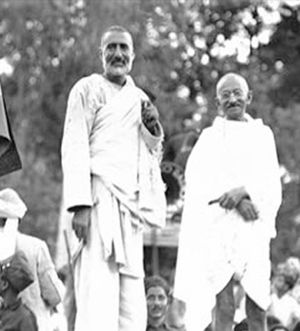From wikipedia:
Khudai Khidmatgar (Pashto: خدای خدمتگار) literally translates as the servants of God. It represented a non-violent freedom struggle against the British Empire by the Pashtuns (also known as Pathans, Pakhtuns or Afghans) of the North West Frontier Province. The movement was led by Khan Abdul Ghaffar Khan, known locally as Bacha Khan or Badshah Khan.
Formed out of the society for reformation of Pashtuns (Anjuman-e-Islah-e-Afghan), it initially targeted social reformation and launched campaigns against prostitution. Bacha Khan as its founder seemed to be influenced by the realisation that whenever British troops were faced with an armed uprising they eventually always overcame the rebellion. The same could not be said when using non violence against the troops.
The movement started prior to the Qissa Khwani bazaar massacre, when a demonstration of hundreds of non violent supporters were fired upon by British soldiers in Peshawar. Its low point and eventual dissipation was after Pakistan's independence in 1947 when the Muslim League Chief Minister Abdul Qayyum Khan banned the movement and launched a brutal crackdown on its members which culminated in the Babra Sharif massacre. At its peak the KK movement consisted of almost 100,000 members.
"The Khidmatgar movement was one of self-reform and introspection," says Mukulika Banerjee, author of The Pathan Unarmed: Opposition and Memory in the North West Frontier (School of American Research Press, 2000). "It involved two crucial elements: Islam and Pashtunwali (the Pashtun tribal code). Here nonviolence becomes an ideological system very compatible with Islam and Pakhtunwali, since these are reinterpreted."
[edit]Genesis
Initially the movement focussed on social reform as a means of improving the status of Pashtuns against the British. Ghaffar Khan founded several reform movements prior to the formation of the Khudai Khidmatgar, the Anjumen-e Islah ul-Afghan in 1921, the farmers' organisation Anjuman-e Zamidaran in 1927 and the youth movement Pashtun Jirga in 1927. Trying to further spread awareness on Pashtun issues Abdul Ghaffar Khan founded the magazine Pakhtun in May 1928. Finally in November 1929, almost on the eve of the Qissa Khwani bazaar massacre the Khudai Khidmatgar were formed.
Under the influence of Abdul Ghaffar Khan the movement advocated non-violent protests and justified their actions through an Islamic context. Khan did not find Islam and non-violence as incompatible. Despite that the movement was intrinsically non-sectarian. In more than one occasion when Hindus and Sikhs were attacked in Peshawar, Khidmatgar members helped protect their lives and property.
“The Holy Prophet Mohammed came into this world and taught us ‘That man is a Muslim who never hurts anyone by word or deed, but who works for the benefit and happiness of God's creatures.’ Belief in God is to love one's fellow men.” – Khan Abdul Ghaffar Khan
“There is nothing surprising in a Muslim or a Pathan like me subscribing to the creed of nonviolence. It is not a new creed. It was followed fourteen hundred years ago by the Prophet all the time he was in Mecca.” – Khan Abdul Ghaffar Khan
Khan always considered trials and tribulations, which he underwent ceaselessly, as the means by which Almighty Allah meant to fashion his life for better things. Being a great humanist, he ardently believed that human nature was not so depraved as to hinder it from respecting goodness in others. It is easy to look down on others but to make an estimate of our failing is difficult. Allah's blessings according to Bacha khan are marked for those, who submit to Allah's will and serve Almighty Allah through selfless activities for the overall good of humanity at large irrespective of caste, colour, race or religions.The Oath of the Khudai Khidmatgar
Oath of the Khudai Khidmatgar:
I am a Servant of God, and as God needs no service, serving His creation is serving Him,
I promise to serve humanity in the name of God.
I promise to refrain from violence and from taking revenge.
I promise to forgive those who oppress me or treat me with cruelty.
I promise to refrain from taking part in feuds and quarrels and from creating enmity.
I promise to treat every Pasthun as my brother and friend.
I promise to refrain from antisocial customs and practices.
I promise to live a simple life, to practice virtue, and to refrain from evil.
I promise to practice good manners and good behavior and not to lead a life of idleness.
I promise to devote at least two hours a day to social work.
I put forth my name in honesty and truthfulness to become a true Servant of God.
I will sacrifice my wealth, life, and comfort for the liberty of my nation and people.
I will never be a party to factions, hatred, or jealousies with my people; and will side with the oppressed against the oppressor.
I will not become a member of any other rival organization, nor will I stand in an army.
I will faithfully obey all legitimate orders of all my officers all the time.
I will live in accordance with the principles of nonviolence.
I will serve all God's creatures alike; and my object shall be the attainment of the freedom of my country and my religion.
I will always see to it that I do what is right and good.
I will never desire any reward whatever for my service.
All my efforts shall be to please God, and not for any show or gain.

No comments:
Post a Comment